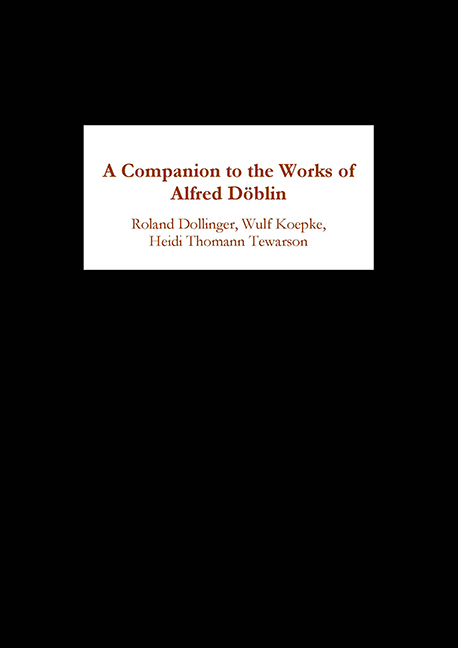Book contents
- Frontmatter
- Contents
- Foreword
- Abbreviations and Translations of Titles
- Works by Alfred Döblin
- Introduction
- Early Works
- Works of the Weimar Period
- Exile and Return to Europe
- Döblin, the Critic of Western Civilization: The Amazon Trilogy
- Döblin's November 1918
- Döblin and Judaism
- Robinson the Castaway: Döblin's Christian Faith as Reflected in His Autobiography Schicksalsreise and His Religious Dialogues Der unsterbliche Mensch and Der Kampf mit dem Engel
- The Tragedy of Truth: Döblin's Novel Hamlet oder Die lange Nacht nimmt ein Ende
- Bibliography
- Notes on the Contributors
- Index
The Tragedy of Truth: Döblin's Novel Hamlet oder Die lange Nacht nimmt ein Ende
from Exile and Return to Europe
Published online by Cambridge University Press: 27 April 2017
- Frontmatter
- Contents
- Foreword
- Abbreviations and Translations of Titles
- Works by Alfred Döblin
- Introduction
- Early Works
- Works of the Weimar Period
- Exile and Return to Europe
- Döblin, the Critic of Western Civilization: The Amazon Trilogy
- Döblin's November 1918
- Döblin and Judaism
- Robinson the Castaway: Döblin's Christian Faith as Reflected in His Autobiography Schicksalsreise and His Religious Dialogues Der unsterbliche Mensch and Der Kampf mit dem Engel
- The Tragedy of Truth: Döblin's Novel Hamlet oder Die lange Nacht nimmt ein Ende
- Bibliography
- Notes on the Contributors
- Index
Summary
The Novel Hamlet oder Die lange Nacht nimmt ein Ende (first published in 1956), like the whole of Döblin's late work, was long overshadowed by his middle period, which reached its pinnacle in Berlin Alexanderplatz (1929). Because of its bold structure and avant-garde narrative technique this novel, on which Döblin scholarship continues to focus primarily even today, came to be the standard by which his entire oeuvre was judged. This led to an underestimation of the later works, especially the Hamlet novel. Döblin's troubles with this novel began with the search for a publisher. Finding no one in the Federal Republic, he published it in the GDR, although he had to change the ending: a protagonist who at the end of a long story retreats to a monastery, as in the original version, was unthinkable in the GDR, Döblin was informed (Graber, 591–93). In the revised version, the protagonist enters the “wimmelnde und geräuschvolle Stadt” (H, 573). Having existed mostly in the past, he awakens, after the death of his parents, to a new life.
When Döblin's work found a wider audience in the 1970s, also indicated by the regular symposia of the International Döblin Society, Hamlet received more attention. Scholarly concern centered around three problems: the alternate ending of the novel; its unusual structure, which combines a novel with a cycle of numerous novellas inserted into the main text; and the role of psychoanalysis, which defines the narrative perspective and the formation of the characters. The present study will also address these three problems and explore the tensions between the literary and theological content, between the aesthetic character and the theological tendency that emerges plainly in this text, written after Döblin's conversion. Having stood politically on the left during the Weimar Republic, although remaining at a critical distance from the Communist left and the leftist Union of Proletarian-Revolutionary Writers, Döblin had converted to Catholicism in 1941, during his American exile. This step, long anticipated in his personal development, caught his friends by surprise. When Döblin revealed his religious orientation at the celebration of his sixty-fifth birthday, it was misunderstood and criticized as a retreat from political engagement.
- Type
- Chapter
- Information
- A Companion to the Works of Alfred Döblin , pp. 271 - 290Publisher: Boydell & BrewerPrint publication year: 2003



